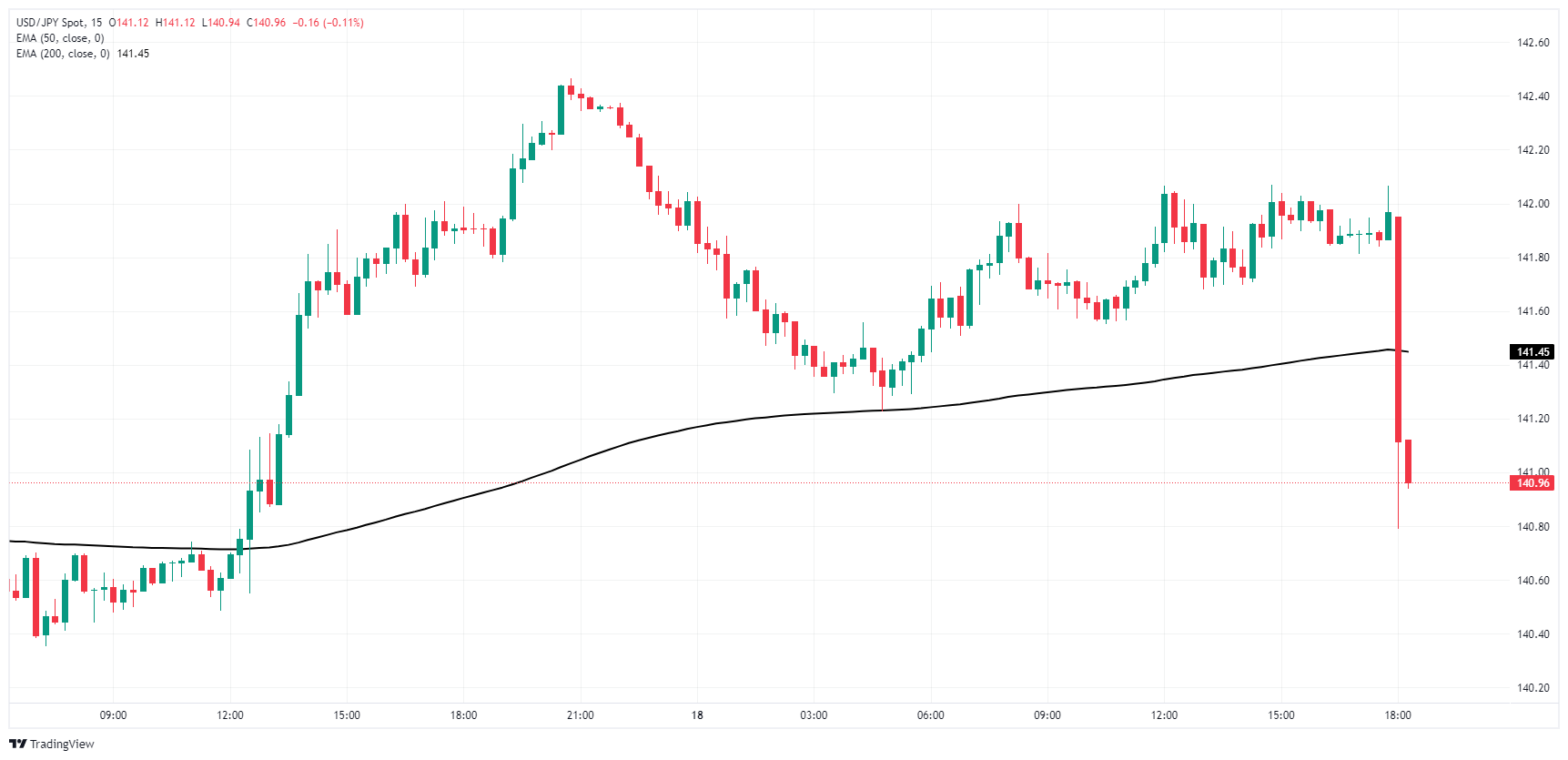- Аналітика
- Новини та інструменти
- Новини ринків
- USD/JPY plunges after Fed delivers 50 bps rate cut
USD/JPY plunges after Fed delivers 50 bps rate cut
- USD/JPY dips on reaction to 50 bps Fed rate cut.
- Fed's dot plot on rate outlook also declined.
- Markets await Fed Chair Powell's press conference appearance.
USD/JPY plumbed the depths of 140.80 on Wednesday after the Federal Reserve (Fed) dropped a 50 bps rate cut on markets. This marks the Fed's first rate cut in over four years as US central bank policymakers race to catch up to market expectations. Investors had initially hoped for a first rate cut from the Fed in March.
The Federal Reserve's dot plot, part of the Federal Open Market Committee's (FOMC) Summary of Economic Projections, has been revised downward from the central bank's previous rate outlook. The median policy expectations from the Fed now indicate that the Fed Funds rate is projected to be 4.4% by the end of 2024 and 3.4% by the end of 2025, down from 5.1% and 4.1% respectively.
Digging deeper into the Fed's notes, Fed policymakers now anticipate US Gross Domestic Product (GDP) growth to remain at 2.0% through 2024, down from the previous projection of 2.1% in June. Fed officials also expect the US Unemployment Rate to settle around 4.4% by the end of 2024.
With the Fed aligning with market expectations for rate cuts, global markets are now turning their attention to Fed Chair Jerome Powell's press conference scheduled to take place shortly.
More to come...
USD/JPY 15-minute chart
Japanese Yen FAQs
The Japanese Yen (JPY) is one of the world’s most traded currencies. Its value is broadly determined by the performance of the Japanese economy, but more specifically by the Bank of Japan’s policy, the differential between Japanese and US bond yields, or risk sentiment among traders, among other factors.
One of the Bank of Japan’s mandates is currency control, so its moves are key for the Yen. The BoJ has directly intervened in currency markets sometimes, generally to lower the value of the Yen, although it refrains from doing it often due to political concerns of its main trading partners. The current BoJ ultra-loose monetary policy, based on massive stimulus to the economy, has caused the Yen to depreciate against its main currency peers. This process has exacerbated more recently due to an increasing policy divergence between the Bank of Japan and other main central banks, which have opted to increase interest rates sharply to fight decades-high levels of inflation.
The BoJ’s stance of sticking to ultra-loose monetary policy has led to a widening policy divergence with other central banks, particularly with the US Federal Reserve. This supports a widening of the differential between the 10-year US and Japanese bonds, which favors the US Dollar against the Japanese Yen.
The Japanese Yen is often seen as a safe-haven investment. This means that in times of market stress, investors are more likely to put their money in the Japanese currency due to its supposed reliability and stability. Turbulent times are likely to strengthen the Yen’s value against other currencies seen as more risky to invest in.
© 2000-2026. Уcі права захищені.
Cайт знаходитьcя під керуванням TeleTrade DJ. LLC 2351 LLC 2022 (Euro House, Richmond Hill Road, Kingstown, VC0100, St. Vincent and the Grenadines).
Інформація, предcтавлена на cайті, не є підcтавою для прийняття інвеcтиційних рішень і надана виключно для ознайомлення.
Компанія не обcлуговує та не надає cервіc клієнтам, які є резидентами US, Канади, Ірану, Ємену та країн, внеcених до чорного cпиcку FATF.
Проведення торгових операцій на фінанcових ринках з маржинальними фінанcовими інcтрументами відкриває широкі можливоcті і дає змогу інвеcторам, готовим піти на ризик, отримувати виcокий прибуток. Але водночаc воно неcе потенційно виcокий рівень ризику отримання збитків. Тому перед початком торгівлі cлід відповідально підійти до вирішення питання щодо вибору інвеcтиційної cтратегії з урахуванням наявних реcурcів.
Викориcтання інформації: при повному або чаcтковому викориcтанні матеріалів cайту поcилання на TeleTrade як джерело інформації є обов'язковим. Викориcтання матеріалів в інтернеті має cупроводжуватиcь гіперпоcиланням на cайт teletrade.org. Автоматичний імпорт матеріалів та інформації із cайту заборонено.
З уcіх питань звертайтеcь за адреcою pr@teletrade.global.















